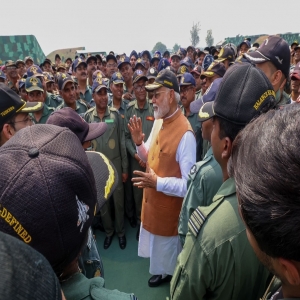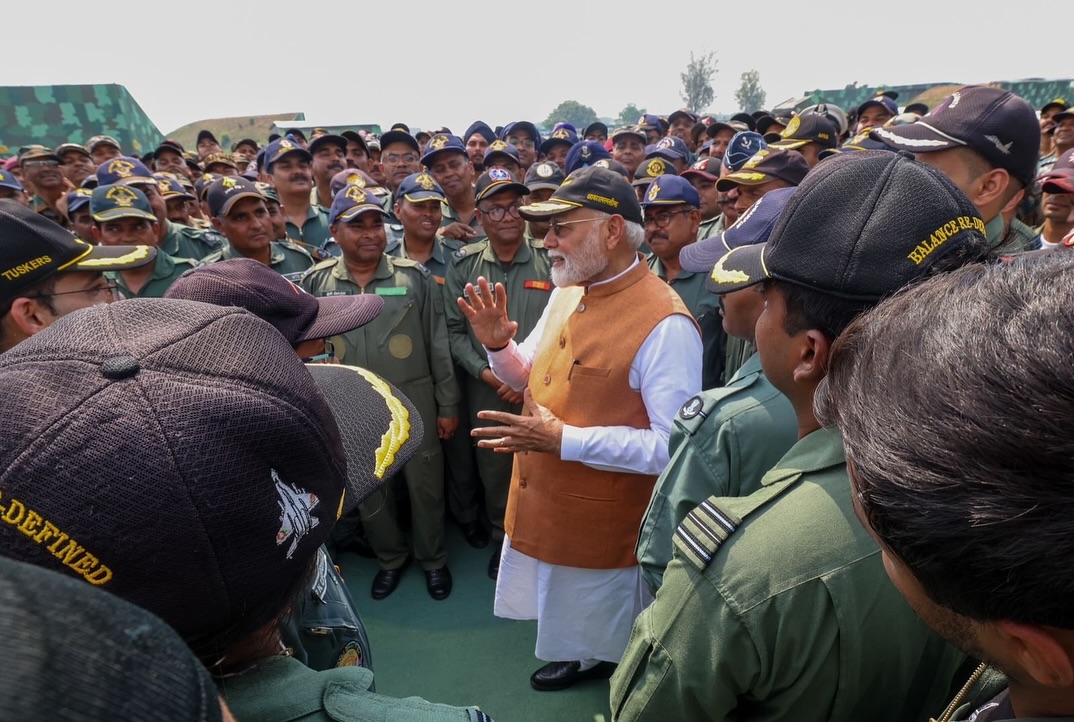
.png) Jacob Peenikaparambil
Jacob Peenikaparambil

Following the cessation of armed hostilities between India and Pakistan, Prime Minister Narendra Modi, in a national address, outlined a three-point doctrine: India will no longer distinguish between terrorists and the governments that sponsor them, it will not be intimidated by "nuclear blackmail," and it will respond to acts of terror on its own terms, at a time and place of its choosing. He referred to Operation Sindoor as India's new official policy against terrorism, emphasising that it has only been paused, not concluded.
India has also announced that seven all-party delegations will visit key partner nations, including members of the UN Security Council, later this month. These delegations will "project India's national consensus and resolute approach to combating terrorism in all its forms and manifestations. They will carry forth to the world the country's strong message of zero tolerance against terrorism."
Against this backdrop, concerned citizens are asking: Are these measures sufficient to combat terrorism and lead the nation forward? While explaining our policies to other countries, should we not also send a message of unity and harmony to the people of India? How have the terrorist attack in Pahalgam and India's military response to Pakistan for supporting terrorism affected social and communal cohesion within the country? Have these events contributed to deepening societal fissures? How can India's internal strength be enhanced alongside its military might and diplomatic relationships?
Two recent articles published in prominent Indian newspapers shed light on the internal socio-political situation: "The Nation in the Mirror" by Suhas Palshikar in The Indian Express (May 15) and "The Hyphen Separating India and Pakistan Collapsed: A Wake-up Call" by Ramachandra Guha in The Telegraph (May 17, 2025). Both articles call on the Indian public for sincere reflection on the state of the nation following the Pahalgam terrorist attack and the subsequent armed conflict.
In his article, Suhas Palshikar identifies three types of public responses in the aftermath of the Pahalgam attack and subsequent ceasefire:
1. The pro-war constituency, for whom de-escalation became a "dirty word" and who demanded war at any cost;
2. Those who wanted to "erase Pakistan" from the world map;
3. The anti-Muslim mobilisation lobby engaged in hate speech and hate crimes against Indian Muslims.
This third group, according to Palshikar, equates Indian Muslims with Pakistan and terrorists. He asserts, "The overlap of these constituencies has been the recipe of Hindutva nationalism—crafting a national imagination that targets Muslims as the permanent enemy within."
Ramachandra Guha argues that over the past decade, India has regressed as a democracy rooted in pluralism and intellectual openness. He notes, "The past decade has witnessed a steady rise of authoritarianism and majoritarianism in India." He suggests this could be why US President Donald Trump recently equated India and Pakistan, despite the clear distinctions between the two. Guha points out that previous US Presidents—Bush, Clinton, Obama, and Biden—never made such a comparison, recognising Pakistan as a theocratic state and India as a secular democracy.
Guha highlights the areas where erosion has occurred:
1. Although elections are held regularly, concerns remain about their fairness;
2. Regulatory and investigative agencies have become highly partisan;
3. Governors appointed by the BJP undermine the federal structure in opposition-ruled states;
4. A cult of personality has developed around the Prime Minister, maintained at significant public expense.
He concludes by urging Indians to rededicate themselves to the founding values of democracy and pluralism.
A nation that is not internally united cannot effectively face external threats. Excluding, discriminating against, and vilifying a community undermines national integration. The failure of BJP's top leadership to reprimand those who trolled Vikram Misri and his family for merely announcing a government decision is a setback to communal harmony. The Prime Minister or the External Affairs Minister should have condemned the trolls and initiated legal action against them.
Similarly, the BJP should have immediately removed Vijay Shah, Madhya Pradesh's Forest Minister, for his repugnant hate speech against Colonel Sofiya Qureshi. Failure to act against hate speech and crimes grants impunity to offenders, endangering national unity.
According to media reports, under pressure from public criticism and opposition attacks over controversial remarks by its leaders regarding Operation Sindoor and the armed forces, the BJP is planning a training program for its politicians in Madhya Pradesh. However, training leaders on what to say is meaningless unless those promoting hate are punished. The BJP must dispel the impression that it rewards hate-mongers.
The party's top leadership must send a clear message that minorities are equal citizens. This involves not just symbolic gestures—like appointing a minority officer to brief the public during a crisis—but also ensuring representation in government as ministers, MPs, MLAs, and bureaucrats. The harassment of minorities by both state and non-state actors must end. As Guha observed during an interview with Karan Thapar on May 16, Muslims and Christians feel more secure and equally treated in Tamil Nadu and other southern states. For India to be internally strong and harmonious, PM Modi and his party must undergo a genuine transformation in their approach to minorities.
The second crucial step is restoring democratic institutions. Public trust in free and fair elections must be rebuilt. This can begin with the appointment of Election Commission members by a committee comprising the Prime Minister, the Leader of the Opposition in the Lok Sabha, and the Chief Justice of India. The government should also initiate dialogue with opposition parties to implement urgently needed electoral reforms.
Legislative processes must be participatory. This means allowing adequate time for parliamentary debate, detailed study by parliamentary committees, public feedback, and opportunities for the opposition to voice their perspectives. Government accountability must be ensured by allowing opposition members to raise questions. The presiding officers of both Houses must act impartially, beyond party affiliations.
Regulatory and investigative agencies must function independently, without political interference. The perception that these agencies are used to target opposition leaders and critics must be eliminated.
The rule of law is the cornerstone of democracy. Laws must be enforced impartially. Bulldozer justice and mob lynching have no place in a democratic society. Non-state actors who take the law into their own hands should be prosecuted as criminals. The Supreme Court must take strict action against officials who demolish homes or businesses without due process despite its clear guidelines.
Judicial reform is essential to ensure the speedy resolution of millions of pending cases, improve the judicial appointment process, and guarantee justice for the poor and marginalised—who make up the majority of undertrial prisoners languishing in overcrowded jails.
The media, often called the fourth pillar of democracy, has a duty to speak the truth and hold the government accountable. According to Reporters Without Borders (RSF), India ranks 151st out of 180 countries in the 2025 World Press Freedom Index. The report highlights a worsening media environment, citing corporate takeovers, political pressure, and the spread of "fake news." The government must stop intimidating journalists and media houses, and journalists jailed on false charges must be released.
The arrest of Ashoka University professor Ali Khan Mahmudabad on the accusation of "disparaging women officers in the Indian Armed Forces and promoting communal disharmony" based on his Facebook post shows the government's allergy to any criticism. In a Facebook post on May 8, Mahmudabad said, "I am very happy to see so many right-wing commentators applauding Colonel Sofiya Qureshi but perhaps they could also equally loudly demand that the victims of mob lynchings, arbitrary bulldozing and others who are victims of the BJP's hate mongering be protected as Indian citizens. The optics of two women soldiers presenting their findings is important but optics must translate to reality on the ground otherwise it's just hypocrisy."
According to the explanation given by Mahmudabad, there is nothing remotely misogynistic or promoting communal disharmony in his Facebook post. Opposition political parties have condemned the arrest. An editorial in The Indian Express on May 19 called it an "Arrest most Foul." "Amid government's call for unity, Ali Khan Mahmudabad's arrest sends a chilling message; violates right to speech," the editorial says.
It is ironic that Vijay Shah, a BJP leader from MP who made distasteful and patently communal remarks against Colonel Sofiya Qureshi, is not punished by the BJP government, while Mr Khan is arrested for exercising his fundamental right to speak. The government has to change its policy of discriminating against and punishing people critical of its policies and actions.
Another grave challenge to Indian democracy is the attack on the federal structure by governors appointed by the Centre. These governors act like parallel chief ministers in opposition-ruled states, obstructing governance and stalling legislation. The central government must stop using governors to create hurdles for these states.
Mixing religion with politics is a dangerous path. History offers numerous cautionary tales: Pakistan, Afghanistan, Iran, Sri Lanka, and Myanmar. Aware of this danger, India's founding fathers embraced secularism, upholding the country's age-old philosophy of unity in diversity. Any attempt to impose uniformity in religion, culture, or language will not lead to Viksit Bharat (Developed India). Leaders must learn from the experiences of Afghanistan and Pakistan.
Ultimately, violence and war are not solutions. History teaches that wars destroy nations while dialogue fosters peace and prosperity. The Franco-German relationship offers a powerful example. After over 150 years of conflict, visionary leaders like Charles de Gaulle and Konrad Adenauer forged a strong post-WWII partnership that eventually led to the formation of the European Union.
Despite setbacks, India and Pakistan must pursue dialogue to resolve long-standing issues. Political leaders must not bow to pressure from warmongers.